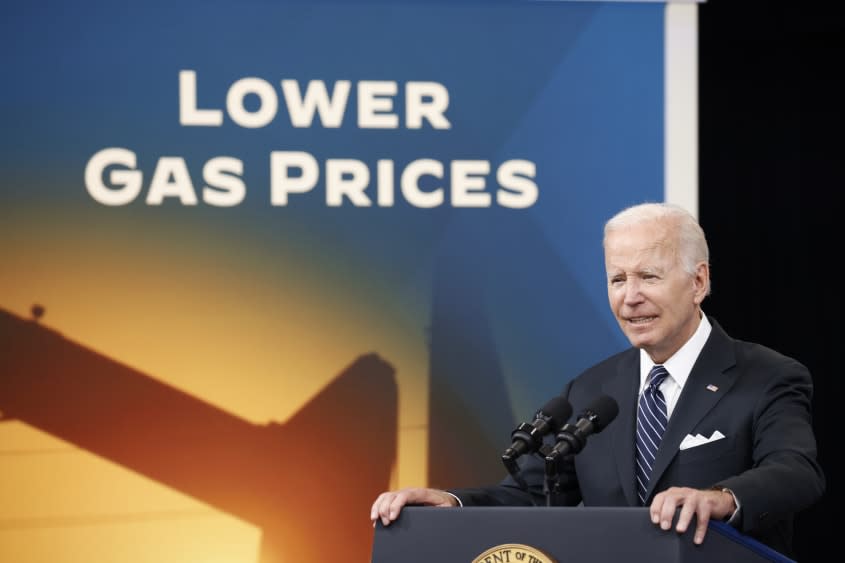Will a gas tax holiday help or hurt?

President Biden on Wednesday announced his support for a three-month federal gas tax holiday, or a suspension of the federal gasoline tax, in hopes of mitigating rising energy prices plaguing Americans nationwide. But even if such a measure passed Congress (which it's unlikely to do, as Politico notes), would it actually make a difference?
Politically, it could offer a boon to Biden
A gas tax holiday would be "politically popular" (remember, it's an election year!) and also "allow the White House to show that Biden is taking tangible action to address one of the biggest headaches facing families," Matt Egan recently wrote in CNN. Though relief would be "modest," a tax holiday on fuel could lower retail prices by as much as 18 cents per gallon of gas and 24 cents per gallon of diesel. At the very least, a tax holiday could cut families some sort of break while the administration works on a more permanent fix, per NPR.
This won't actually make a difference — in wallets or in the polls
But speaking of modest relief …
With potential savings that clock in at "less than 5 percent of the total cost" at the pump, some experts worry "consumers may not even notice" a tax holiday, wrote The New York Times. And maybe, those who do would be the wrong ones. Though gasoline accounts for a greater share of working Americans' expenditures, "rich people spend much more money on gas than poor people," Henry Grabar argued for Slate in March. That means "there are fairer ways to help low-income Americans make ends meet — and smarter ways to target gas price relief to help important, inflation-fueling industries like agriculture and shipping."
It will just make prices, and inflation, worse
In addition to having perhaps just a modest effect on wallets, "almost everything about a gas tax holiday runs in the wrong direction," including its overall effect on prices, Senior Contributor Howard Gleckman mused for Forbes on Wednesday. While a tax suspension would "lower the after-tax price of gas," it would in turn boost demand, thus worsening supply shortages and raising fuel's pre-tax price, Gleckman wrote. "Any net benefit for drivers would be very small," he added.
And The Hill Opinion Contributor Maya Macguineas agreed: While a gas tax holiday might offer "temporary relief at the pump," it would ultimately just "exacerbate inflationary pressures" and present politicians with an opportunity "to pretend they are making the situation better, when in fact they are making it worse," she posited in February. As Gleckman also noted, "oil producers and gas stations are likely to respond to the holiday by raising the pre-tax price of gasoline," meaning the "largest beneficiaries" of the suspension may very well be the same oil producers Biden has continuously derided.
"By making gas cheaper that allows people to buy more of it," explained economist Carola Binder, as quoted by NPR. "It's giving them a tax cut and that gives them more to spend elsewhere. So that is going to lead to more inflationary pressures elsewhere."
It takes money away from infrastructure
The gas tax funnels money into the Highway Trust Fund, which pays for improvements to roads, bridges, and other pieces of the nation's infrastructure. But the fund, which is not indexed for inflation, is already close to insolvency — and a tax holiday "will only compound this problem," the Bloomberg Opinion Editorial Board argued in February.
Under a suspension, "the cost of repairing and maintaining highways will rise along with inflation while the trust fund is depleted all the faster," the board opined. And that's without mentioning that "declining gas tax revenue" has already "forced the U.S. to transfer hundreds of billions of dollars of general fund revenue into the Highway Trust Fund over the past decade," Grabar wrote in Slate.
Simply "robbing Peter to pay Paul would still increase the size of our massive federal debt and undermine efforts to assure sustainable infrastructure financing," Macguineas added.
And what about the climate?
On top of everything else, a federal gas tax would serve to "amplify the climate crisis and slow the development and adoption of cleaner technologies," Macguineas continued in the Hill. The country should be moving in the "opposite direction" instead, perhaps "replacing or supplementing the gas tax with broader carbon pricing" that would "efficiently reduce emissions and encourage new technologies," she suggested. A gas tax holiday would just "slow progress" in this area.
Ultimately, the suggestion is merely a political move offering "a short-term gain with a long-term cost to infrastructure and the climate," added the Los Angeles Times Editorial Board in February. "Voters can recognize a gimmick when they see it."
You may also like
People at Jan. 6 rally were 'well-behaved,' Trump tells Newsmax
Is America abandoning religion — or just remixing it?
Baltimore Ravens linebacker Jaylon Ferguson dies at 26: 'A life lost much too soon'

